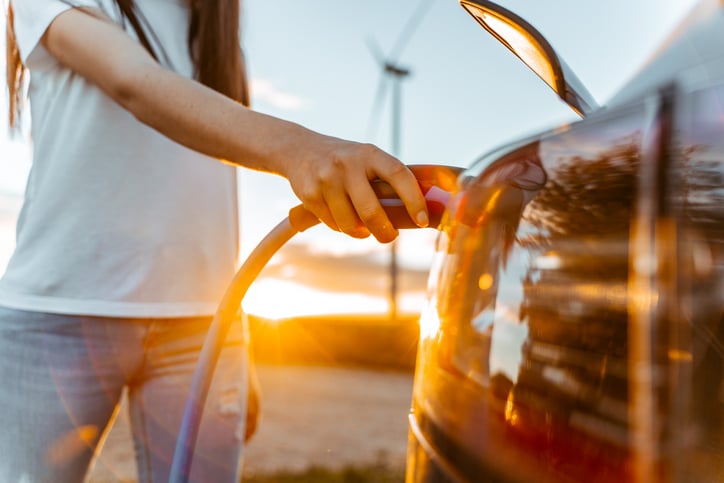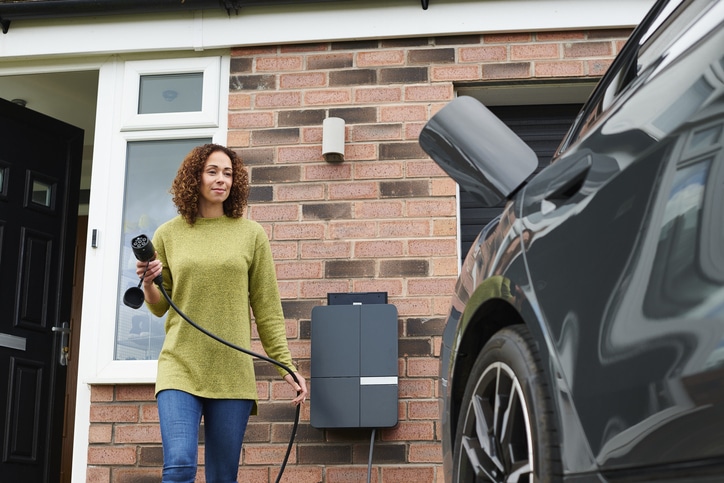EV MythBusters – 14 Common Electric Vehicle Myths
August 1, 2023
Dick Hannah Dealerships is dedicated to ensuring that our customers have access to accurate and dependable information regarding electric vehicles. In line with our commitment, we have compiled a comprehensive list of 14 prevalent myths and misconceptions surrounding electric cars. By debunking these misconceptions, we aim to equip you with the knowledge necessary to make an informed decision when considering an electric vehicle for your next purchase.
Myth #1 EVs don’t have enough range. You can’t travel very far before running out of electricity.
Another case of classic range anxiety! It’s one of the most commonly cited concerns when considering a switch to an electric vehicle (EV). The earliest electric vehicles on the market faced driving range issues. As a result, people still tend to be skeptical about EV ranges. The perceived lack of charging availability also tends crop up in our minds when we think about going electric. Many people have visions of getting stranded in the middle of nowhere with a depleted battery, reliant on a good samaritan with an extension cord.
Fact: Modern EVs have made significant advances in battery technology, and many new models boast ranges that rival or even surpass that of their gasoline counterparts. Several EVs on the market today offer ranges well over 200 miles on a single charge, with some high-end models exceeding 300 or even 400 miles! Furthermore, the growth of charging infrastructure in states like Oregon and Washington means that it’s becoming easier than ever to find a fast charger while you’re on the go. Combined with the daily driving habits of most people, these improvements make range anxiety largely a thing of the past
Myth #2 EVs are as slow as golf carts.
Remember that one time you rode in a golf cart and felt the breeze gently tousling your hair as you cruised the greens at a leisurely pace? Some people mistakenly think EVs offer a similar experience on the highway, believing them to be more suited for a putt-putt than a trip down the freeway. It’s an amusing image—your trusty EV rolling along the freeway as semis and sedans whiz past. But just as we’ve evolved from horse-drawn carriages to roaring V8 engines, EVs are a testament to the leaps and bounds of modern automotive engineering, promising not just a clean drive, but a lively one too!
Fact: Electric vehicles can pack a serious punch when it comes to performance. Many EVs accelerate faster than gasoline vehicles because electric motors can provide instant torque. That means you get all that power immediately, right from a stop. Some of the world’s fastest production cars are now electric, reaching 0 to 60 mph in under 3 seconds! So, the next time someone compares an EV to a golf cart, just smile and think of the unsuspecting sports car that was left in the dust by a quiet, unassuming electric sedan at the last stoplight.
Myth #3 EVs are not safe
Safety first! With the transition from gasoline to electric vehicles, some folks have raised concerns that these newfangled machines may not be as safe as traditional cars. Visions of shocking incidents or batteries turning into fireballs can be alarming.
It’s worth noting that every innovation, be it the first airplane flights or the initial gas-powered cars, faced skepticism. Over time, as technology improves and standards are established, what once seemed alien becomes commonplace and trusted. So let’s dive into how EVs stand in the arena of safety, and whether the electrifying tales have merit.
Fact: Electric vehicles go through the same rigorous testing and safety regulations as gasoline-powered vehicles. In many cases, EVs have proven to be as safe, if not safer, than their gasoline counterparts. They often have a lower center of gravity due to the battery placement, making them less prone to rollovers. Additionally, the absence of combustible gasoline reduces the risk of fire in many accident scenarios. Modern batteries also have advanced safety features, and the likelihood of them catching fire is rare. Many electric vehicles have also received top safety ratings in their class.

Myth #4 They’re not any “greener” than gas-powered vehicles
When you see an electric vehicle cruising down the streets of Portland, you might wonder: is it genuinely green or just a wolf in sheep’s clothing? With their silent operation and zero tailpipe emissions, EVs certainly seem like the poster child for clean transportation. But beneath their sleek exteriors and dashboard displays, how do they truly measure up in the broader environmental picture?
Fact: While it’s true that the environmental impact of EVs depends partly on the electricity source (e.g., coal vs. renewable energy), EVs are generally cleaner over their lifecycle than traditional vehicles. In regions where renewable energy sources like wind and solar power the grid, the difference is even starker. Additionally, even if charged from a grid that uses fossil fuels, EVs are more efficient than gasoline engines, which means they still often produce fewer emissions per mile. And let’s not forget, the electric grid is getting cleaner every year as renewable energy sources continue to grow.
Myth #5 Electric vehicles are worse for the climate than gasoline cars because of battery manufacturing
Batteries: They’re at the heart of every EV, but some have concerns that their production might negate any environmental benefits electric vehicles bring to the table. Their significance cannot be understated in the world of electric transportation. However, alongside their rising prominence come whispers of doubt.
How are these batteries made? What’s their environmental footprint?
These are solid questions to ask, ones that delve deep into the lifecycle of batteries and the broader ambition of sustainable transportation. Before jumping to conclusions, let’s dissect the facts and untangle the web of battery production and its environmental impact.
Fact: It’s true that the production of batteries, especially lithium-ion batteries used in most modern EVs, has an environmental footprint. However, when you take into account the vehicle’s entire lifecycle – from manufacturing to end-of-life – EVs typically have a significantly lower carbon footprint than gasoline vehicles. A majority of an EV’s emissions come from the initial production phase, particularly the battery. Still, these are quickly offset by the immense savings in CO2 emissions during the vehicle’s operational life, especially when charged from renewable sources. Also, advancements in recycling technologies and the drive towards more sustainable battery materials promise to reduce the environmental impact of battery production in the future.

Myth #6 There is nowhere to charge.
One of the main concerns for potential EV adopters is the fear of getting stranded without a charge. This fear stems from our reliance on gas stations and the availability of charging points.
However, it’s important to note that charging infrastructure for electric vehicles is rapidly expanding, with more charging stations being installed in various locations. Additionally, advancements in battery technology are continuously improving the range and performance of electric vehicles, alleviating concerns about running out of power during longer trips.
Fact: The charging infrastructure has grown exponentially over the past decade. Today, there are tens of thousands of public charging stations across the United States, including many in the Oregon and Washington areas. Many of these are fast chargers, capable of getting your battery from 0% to 80% in less than an hour. Plus, most EV owners do the majority of their charging at home overnight. With planning tools and apps designed specifically for EV owners, finding a charging station on your route has never been easier.
Myth #7 Based on the price of Gas – Driving an EV won’t save money over time
With fluctuating gas prices, many folks are crunching the numbers to determine if making the switch to electric truly leads to savings in the long run.
A significant chunk of these concerns stems from the initial investment; historically, EVs came with heftier price tags than their gasoline counterparts. Additionally, the unfamiliarity of the EV ownership model, which includes potential home charging installation costs and uncertainties about battery replacement, can cast a shadow of doubt. Furthermore, many worry about the longevity and cost efficiency of batteries, especially given stories from early adopters facing expensive replacements.
Fact: Even when gasoline prices are low, operating an electric vehicle tends to be more economical than a gasoline-powered car. Electricity is generally cheaper than gasoline on a per-mile basis, and this cost advantage can be even more significant in areas with high electricity generation from renewables. Furthermore, EVs have fewer moving parts than traditional vehicles, which typically means fewer things that can go wrong and thus lower maintenance costs over the vehicle’s lifespan. When you factor in potential government incentives and rebates for EV ownership, the cost benefits become even more apparent.
Myth #8 Electric cars are costly to maintain and repair.
The thought of having to repair or maintain a new technology can be daunting. After all, aren’t EVs filled with complicated electronics and newfangled tech that could cost an arm and a leg to fix?
The thought of having to repair or maintain emerging technology can be intimidating. With their advanced electronics and cutting-edge components, one might think EVs are a mechanic’s nightmare, potentially leading to hefty repair bills.
But here’s the twist: as the EV market expands, traditional mechanics are upskilling and adapting. Many automotive schools and training programs are now offering courses specifically tailored to electric vehicles.
Fact: Electric vehicles generally have fewer moving parts than their internal combustion engine (ICE) counterparts. No oil changes, no exhaust systems, no transmissions, and no timing belts to worry about. This translates to less routine maintenance and fewer things that can go wrong. While it’s true that if an EV’s battery needs replacing it can be costly, most batteries are designed to last for well over a decade, and many manufacturers offer long-term warranties that cover battery replacement. Over the lifespan of the car, many EV owners find that they spend significantly less on maintenance and repairs compared to owners of gasoline-powered vehicles.
Myth #9 EVs won’t be practical to own without a fully established infrastructure of public charging stations.
It’s a common belief: “No extensive charging network, no EV for me!” Many potential buyers fear the idea of owning an EV without having a charging station at every corner like a gas station.
However, this perspective is gradually changing with the rapid expansion of charging infrastructure. Major cities and even smaller towns are integrating public charging stations into their urban planning. Additionally, with home charging solutions becoming more accessible, many EV owners can start their day with a “full tank” without ever visiting a public charger.
Fact: While having a robust network of public charging stations is definitely a boon for EV owners, many forget that the majority of charging happens at home. Imagine waking up every morning with a “full tank” because you charged your car overnight. That’s the reality for many EV owners. Plus, with the increasing number of public charging stations popping up at malls, workplaces, and various other locations, combined with faster charging speeds, it’s becoming more and more convenient for EV owners, even without a “fully established” network.

Myth #10 Electric vehicles don’t have enough range to handle daily travel demands.
Range anxiety strikes again! It seems many believe that EVs are only suitable for short jaunts around the city, but not for the daily demands of the modern commuter. Yet, advancements in battery technology and energy density have dramatically extended the range of many new EV models.
Today, numerous electric vehicles can cover distances comparable to, if not exceeding, those of their gasoline counterparts on a single charge. As more consumers experience firsthand the evolving capabilities of electric vehicles, the myth of limited range is quickly being dispelled.
Fact: Studies have shown that the average American drives less than 40 miles per day. Even modestly ranged EVs today offer well over 100 miles of range, with many new models surpassing 200 to 300 miles on a single charge. This means that for the vast majority of drivers, an electric vehicle can easily handle daily travel demands with plenty of charge to spare. Plus, with fast-charging options available, even longer trips can be managed comfortably with brief charging stops.
Myth #11 Electric vehicles are not as safe as comparable gasoline vehicles.
We’ve been driving gasoline-powered vehicles for over a century now. With the emergence of EVs, there’s a concern that they might not measure up in terms of safety.
Fact: Electric vehicles are subjected to the same rigorous safety testing standards as gasoline vehicles. In fact, many EV models have received top safety ratings in crash tests conducted by independent organizations. The design of EVs often offers additional safety benefits: their lower center of gravity reduces rollover risks, and the absence of a gasoline tank eliminates certain types of fire hazards. Moreover, the structure of EVs, including the placement of the heavy battery packs, can contribute to better crash energy absorption. So, in many respects, EVs can offer safety features that are on par with, or even surpass, those of traditional vehicles.
Myth #12 EV batteries don’t last long and will eventually wind up in landfills.
The idea of mountains of spent EV batteries piling up in landfills is a disheartening one. Many skeptics are concerned that while we’re driving into a cleaner future, we’re leaving behind a trail of waste. But there’s a silver lining. The push for sustainability has spurred innovations in recycling and repurposing used batteries, leading us towards solutions that are both environmentally responsible and efficient.
Fact: Modern EV batteries are designed to last a long time, often well beyond a decade. Even after they’ve outlived their usefulness in vehicles, many can be repurposed for secondary applications like energy storage for renewable power sources. Beyond that, there is a growing focus on recycling EV batteries. Companies and researchers are developing efficient methods to extract and reuse valuable materials from spent batteries, ensuring that they don’t end up in landfills. As the EV market grows, so too will the recycling infrastructure to support it.
Myth #13 The power grid won’t be able to handle the hundreds of thousands of EVs expected down the road.
Picture this: A future where streets are lined with electric cars, all plugging in and drawing power, and suddenly, the grid collapses! It’s a concern many have about the rise of EVs. It sounds like a scene from a dystopian novel, but in reality, energy providers are anticipating this shift and are making preparations. Integration of renewable sources and advancements in grid technology ensure a future where the lights stay on, and EVs keep rolling.
Fact: The integration of EVs into the power grid is a topic that utilities and researchers have been diligently exploring. While there will undoubtedly be a need to upgrade certain components of the grid and improve its capacity, it’s not an insurmountable challenge. Smart charging solutions, which can manage when and how EVs are charged, can distribute the load evenly, preventing sudden spikes in demand. Furthermore, renewable energy sources like wind and solar are continuously being added to the grid, increasing its capacity. There’s also potential for EVs to give back to the grid, with vehicle-to-grid technologies allowing cars to feed energy back during peak times. With proper planning and investment in infrastructure, the grid will be well-equipped to handle the electrified future.
Myth #14 Dealers Don’t Have EVs
When it’s time to car shop, a common assumption is that dealerships are primarily stocked with gasoline-powered options, with maybe just one or two lonely EVs lurking in the corner—if they have any at all. With the success of Tesla and other luxury EV car companies, it is sometimes hard to believe that bigger brands like Toyota or Nissan would be caught up to meet the demand. Gas is still king right?
Fact: Times have changed! Many dealerships, including those in the Pacific Northwest, have recognized the growing demand for electric vehicles and have expanded their inventories to include a variety of EV models. Brands like Nissan, Toyota, Honda, and Hyundai have been investing in EV technology for many years now. These industry giants, with their vast resources and deep expertise in automotive engineering, have not only been refining the performance and efficiency of electric vehicles but also spearheading innovations that are shaping the future of transportation. From luxury brands to more affordable options, there’s an increasing selection of electric vehicles available on the lot. As the auto industry continues its shift towards electrification, you can expect to see even more EVs showcased front and center at dealerships, ready for test drives and new homes.
Wrapping up
In the fast-paced world of evolving technology, it’s easy to become entangled in myths and misconceptions, especially when it comes to electric vehicles. We hope this guide has shed light on some common EV myths and provided clarity for those curious about making the transition to electric. The electric vehicle market is advancing every day and it is important to stay current with the most updated information to stay in the know.
Embarking on the electric vehicle journey? Look no further than Dick Hannah Dealerships. As enthusiasm and curiosity surrounding EVs grow, we’re stepping up to the forefront, striving to be the leading authority in the Portland/Vancouver area. We understand the questions and sometimes misconceptions surrounding electric vehicles.
Our mission is to shed light on these areas, helping consumers navigate the landscape with clarity and confidence. By providing expert knowledge and a wide selection of EVs, we hope to be the first place you think of when considering an electric ride. With Dick Hannah Dealerships, you’re not just buying a car; you’re investing in a cleaner, greener future with a trusted partner by your side.
Contact Us